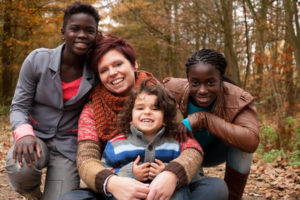 Adoption is, at its essence, about creating loving bonds built by intention instead of biology. Often we refer to ourselves as Forever Families. This phrase intends to reassure adoptees that they’ve landed in a safe harbor where they can expect and depend on a permanent, safe and loving family.
Adoption is, at its essence, about creating loving bonds built by intention instead of biology. Often we refer to ourselves as Forever Families. This phrase intends to reassure adoptees that they’ve landed in a safe harbor where they can expect and depend on a permanent, safe and loving family.
Recently I’ve begun to consider that an unintentionally negative message hides inside the term Forever Family. If adoptive families are lauded as “forever”, the implied message is that birth families are temporary, that adoption completely eradicates the link between birth family and adopted child.
Think about that for a minute. Our children’s DNA isn’t temporary; it permanently dictates their biological information. Equally constant is their need to understand how that biology contributes to their identity, their aptitudes and their health. Most adoptees have a deep interest in connecting with their roots. For some this translates into a yearning for reunion. For others, an uncovering of factual information is adequate.
Twenty-nine years ago when we adopted our first child, we naively believed that he was a blank slate, a precious branch we could graft onto our family tree. We believed that his “old” life as part of his birth family and his new life adopted into ours were divided into a grand Before and After.
Fortunately, we’ve released this outdated and false belief and have become Adoption Attuned, educated by advances in both neuroscience and in adoption research. We have embraced a new understanding that respects our children’s roots, values their birth families, and appreciates the reality that we are all part of an inclusive and extended family—even though our adoptions were closed. (We facilitated their reunions with their birth moms after they turned eighteen.) We’ve come to recognize and appreciate that our children’s biological families are a permanent part of our family because their biology is an essential part of who our children are. And, their birth family is an essential part of their past as well as their future. This occurs even in adoptions where there is no further contact between an adoptee and his birth family.
In this video, a dedicated dad hikes up a mountain while he personally pulls his disabled son. His commitment to his son is extraordinary and visible. His love in action impresses anyone who watches.
As adoptive parents, we too have an opportunity to step beyond the ordinary and to embrace an extraordinary commitment to our kids. This means embracing our children with totality and inclusion. We can live a permanent, genuine parental relationship with our kids WITHOUT requiring them to relinquish their emotional attachment to their roots and their birth families. We can steep our conversations and actions towards their birth families with respect and clearly convey to our kids that is okay for them to wonder about, talk about, and value their connection to their birth families.
Recognize that we are not in competition with their birth families. We have been given the opportunity to step in when their birth families could overcome the challenges that made it impossible for them to raise our kids.
We can decide not to add to our children’s adoption losses by requiring them to choose between us and their birth families. Convey to them the belief that there is room in our hearts, just as there is space in theirs for both birth and adoptive family relationships. Relinquish the loyalty-oath-thinking of blank-slate adoption theory and support our children’s healing. We are all—adoptive and birth families—permanently linked.
Without a doubt, adoption steps in when biological families cannot function to nurture, raise, and provide for adoptees. While I recognize that some children must be protected from dangerous relationships with relatives who neglected or abused them, the link that connects them—biologically, emotionally, historically—is real and permanent.
My concluding point is: for our adopted children, birth families are also forever families.
So how do we reassure our adopted children that we are in their lives for the long haul without asking them to choose between their two very real—and forever—families? What name can we give this permanent commitment to them that is adoption? Does this fussing about terminology matter? I believe it does. What is your opinion?



A thoughtful post for sure! You ask some intriguing questions. “Does fussing about terminology matter?” Yes. Just thinking about this issue creates space for conscious, intentional behavior that might further healthy development of our adopted children and our relationship with them. Adoption is definitely not a one time event. Thinking about it and testing our assumptions about it is a good thing.